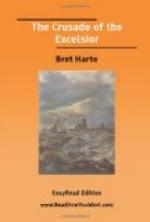“We’ll go to supper,” said Miss Montgomery theatrically, appearing at the door. “Dick will give me his arm.”
CHAPTER II.
The mourners at Todos Santos.
There was a breath of spring in the soft morning air of Todos Santos—a breath so subtle and odorous that it penetrated the veil of fog beyond the bay, and for a moment lingered on the deck of a passing steamer like an arresting memory. But only for an instant; the Ometepe, bound from San Francisco to San Juan del Norte, with its four seekers of the Excelsior, rolled and plunged on its way unconsciously.
Within the bay and over the restful pueblo still dwelt the golden haze of its perpetual summer; the two towers of the old Mission church seemed to dissolve softly into the mellow upper twilight, and the undulating valleys rolled their green waves up to the wooded heights of San Antonio, that still smiled down upon the arid, pallid desert. But although Nature had not changed in the months that had passed since the advent of the Excelsior, there appeared some strange mutations in the town and its inhabitants. On the beach below the Presidio was the unfinished skeleton of a small sea-going vessel on rude stocks; on the plaza rose the framed walls and roofless rafters of a wooden building; near the Embarcadero was the tall adobe chimney of some inchoate manufactory whose walls had half risen from their foundations; but all of these objects had evidently succumbed to the drowsy influence of the climate, and already had taken the appearances of later and less picturesque ruins of the past. There were singular innovations in the costumes: one or two umbrellas, used as sunshades, were seen upon the square; a few small chip hats had taken the place of the stiff sombreros, with an occasional tall white beaver; while linen coat and nankeen trousers had, at times, usurped the short velvet jacket and loose calzas of the national costume.
At San Antonio the change was still more perceptible. Beside the yawning pit of the abandoned silver mine a straggling building arose, filled with rude machinery, bearing the legend, painted in glowing letters, “Excelsior Silver Mining Co., J. Crosby, Superintendent;” and in the midst of certain excavations assailing the integrity of the cliff itself was another small building, scarcely larger than a sentry-box, with the inscription, “Office: Eleanor Quicksilver Smelting Works.”
Basking in that yellow morning sunlight, with his back against his office, Mr. Brace was seated on the ground, rolling a cigarette. A few feet from him Crosby, extended on his back on the ground, was lazily puffing rings of smoke into the still air. Both of these young gentlemen were dressed in exaggerated Mexican costumes; the silver buttons fringing the edge of Crosby’s calza, open from the knee down to show a glimpse of the snowy under-trouser, were richer and heavier than those usually worn; while Brace, in addition to the crimson silk sash round his waist, wore a crimson handkerchief around his head, under his sombrero.




